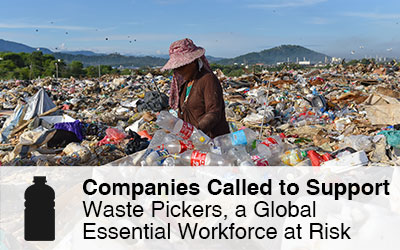
Companies Called to Support Waste Pickers, a Global Essential Workforce at Risk
Workers who handle waste and recyclables support the health of our communities, economies, and the environment at the expense of their own health and wellbeing. On a daily basis, they may be exposed to hazardous materials, such as household cleaners, pesticides, and medical waste. The COVID-19 pandemic only heightens these health risks, particularly to informal waste pickers who collect the recyclable materials that we throw in the trash.